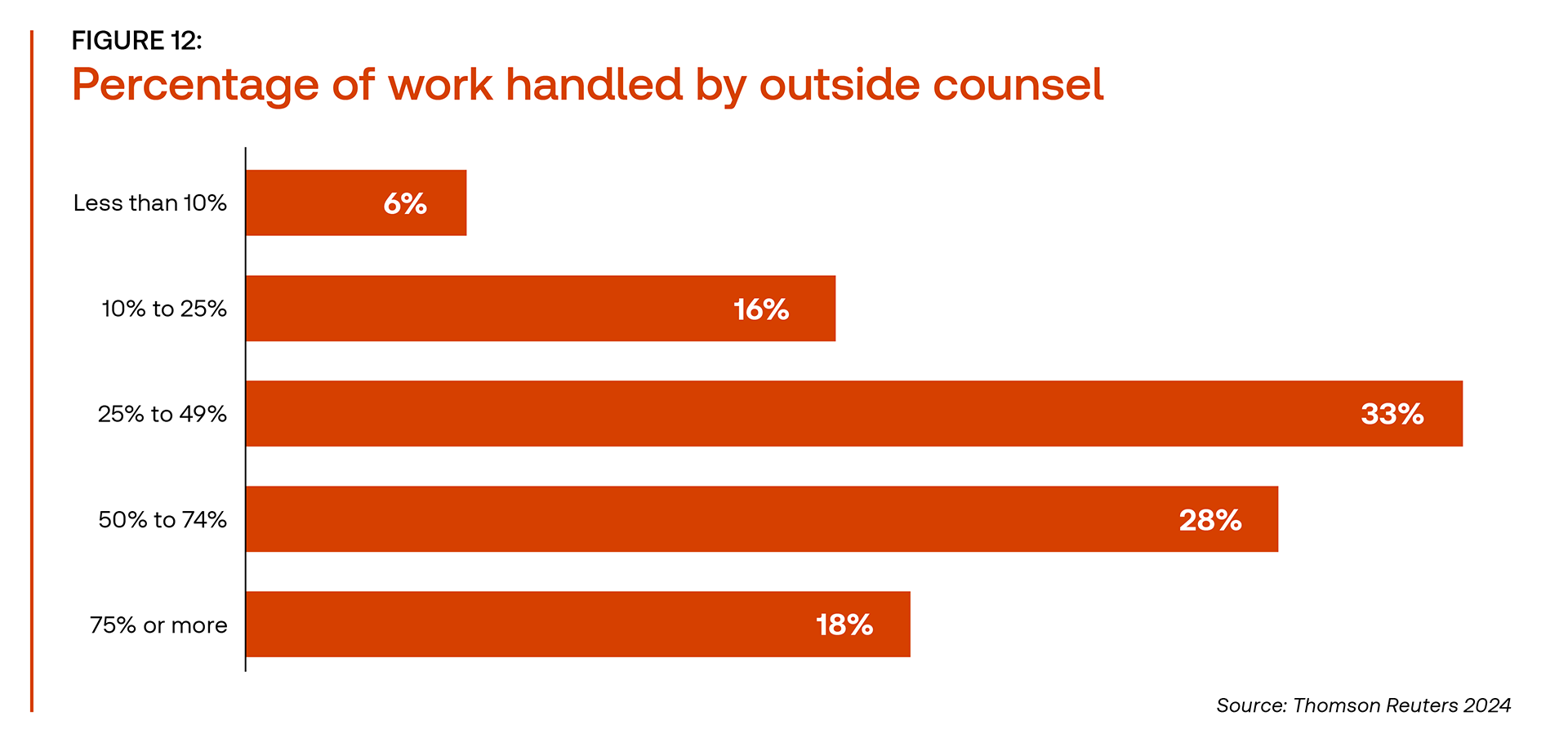The pressure to balance rising outside counsel costs with increasing matter volumes and declining in-house lawyer headcounts has many corporate law departments looking for technological solutions
The top priority for corporate law departments — not surprisingly — is the need to control outside costs. In fact, according to the Thomson Reuters Institute’s recently released 2024 Legal Department Operations Index (LDO Index) report, the percentage of in-house legal operations teams identifying cost control as a high priority increased 6 percentage points in just one year.
Clearly, this reflects the seemingly endless pressure to contain outside counsel expenditures in an era in which outside law firm billing rates have been growing by an average of 6.5% and in some cases much more.
Efforts to contain outside legal costs are not just hampered by increasing law firm rates, however. Corporate law departments are finding themselves in a difficult paradox — facing high pressure from company management to keep costs down while also dealing with increasing matter volumes and little in terms of additional in-house resources.
For many corporate general counsel (GCs), the intention to bring more work in-house plays a key part in their cost-reduction strategies. However, among the legal operations teams supporting those GCs, the report shows that only a little more than one-third (36%) say that an increasing share of work being handled in-house. Of course, this apparent disconnect may be easy enough to explain.
For nearly 8 in 10 corporate law departments (79%), legal matter volumes increased over the past year. At the same time, nearly two-thirds of corporate law departments reported flat or decreasing attorney headcounts. As a result, law departments may be finding themselves in a situation in which a lack of capacity is impacting their ability to absorb more work.
However, as matter volumes increase, that work will have to go somewhere, and outside law firms are currently the most logical choice.
According to the majority of respondents in the LDO Index survey, at least 25% of their legal work is handled by outside counsel. Indeed, nearly half of respondents (46%) said that half or more of their legal work is handled by outside law firms.

However, the juxtaposition of increasing matter volume and decreasing in-house lawyer headcount does not mean that GCs are without options. In fact, their most likely option to help absorb some of the excess work is also among their highest priorities.
While controlling outside counsel costs is the top high-priority item for corporate law departments, a close second (75%) is using technology to simplify workflows. In some instances, this could mean the introduction of advanced technologies driven by artificial intelligence (AI) to help produce legal work product — however, those appear to be relative outlier use cases at this point. Just 14% respondents of law firms and corporate law departments report currently using generative AI (Gen AI) technologies, according to the most recent research from the Thomson Reuters Institute.
Instead, a desire to leverage technology to automate manual tasks and streamline relatively low-value work is the more common approach. The Top 5 potential use cases for GenAI technology in a corporate law department are: contract drafting, document review, legal research, document summarization, and extracting contract data. These are all necessary tasks, certainly, but also are ones which can readily be streamlined and simplified by GenAI and then reviewed by experienced eyes — allowing that time spent doing that non-streamlined work to be repurposed to higher-value tasks.
Through the deployment of Gen AI and other advanced technologies, corporate law departments are seeking to boost the capacity of each individual member of their teams, and thereby, enhance the productivity of the team as a whole. As the adoption of such technologies becomes more widespread, corporate law departments will likely find new ways to balance their increasing matter volumes and budgetary constraints. If each member of the law department can increase their personal output capacity by 10%, that is much less work that will require the hiring of outside counsel.
Of course, outside counsel will remain vital for their experience and expertise. Indeed, expertise is one of the chief reasons outside lawyers are hired today and the value of that expertise is unlikely to diminish as the law gets more complex. However, corporate law departments will likely use all tools at their disposal to handle their increasing matter volumes in the most cost-effective ways possible.
You can download a full copy of the Thomson Reuters Institute’s 2024 Legal Department Operations Index report here.







